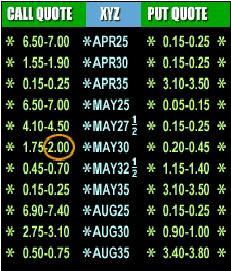What is option “premium”?
The premium is the price at which an option trades, and is paid by the buyer to the writer (seller) of the contract. The premium paid by the buyer is non-refundable payment for the rights inherent in the long contract. The writer (seller) of an option contract keeps the premium received, whether assigned or not, and is in turn obligated to fulfill the short contract’s obligations if assignment is received. The two components of an option’s total premium are intrinsic value and time value.
Intrinsic Value
Intrinsic Value
Intrinsic value represents the amount, if any, by which an option contract is in-the-money. By definition, at and out-of-the-money options do not have intrinsic value.
Time Value
Time value represents the portion of an option’s total premium that exceeds its intrinsic value, if it has any. By definition, the premium of at and out-of-the-money options is entirely time value.
What is “time decay”?
Time decay (or time “erosion”) is the inevitable phenomenon of decay, or decrease, of an option premium’s time value due to the passage of time. The rate of this decay increases as expiration approaches (like you’re approaching a waterfall). At expiration a call or put is worth only its intrinsic value, if it has any.
You entered an order to buy a call option for $3.25 but your brokerage firm rejected the price?
As an industry standard, most option contracts traded at prices greater than $3.00 must trade in $0.10 (10¢) increments. Therefore, the purchase price for this buy order must be either $3.20 or $3.30. For prices under $3.00 the increments may be $0.05 (5¢)
 Example : Referring to diagram, XYZ represents the option class while May 30 is the option series. All options on company XYZ are in the XYZ option class but there will be many different series.
Example : Referring to diagram, XYZ represents the option class while May 30 is the option series. All options on company XYZ are in the XYZ option class but there will be many different series.
An option Premium is the price of the option. It is the price you pay to purchase the option. For example, an XYZ May 30 Call (thus it is an option to buy Company XYZ stock) may have an option premium of $2.
This means that this option costs $200.00. Why? Because most listed options are for 100 shares of stock, and all equity option prices are quoted on a per share basis, so they need to be multiplied times 100.
NOTE: There are times when an options contract is adjusted for an amount other than 100 shares as a result of a merger or stock split.
Other Articles That May Interest You …

|
|
November 6th, 2006 by financetwitter
|


|

|

|

|

|

|




























Comments
Add your comment now.
Leave a Reply